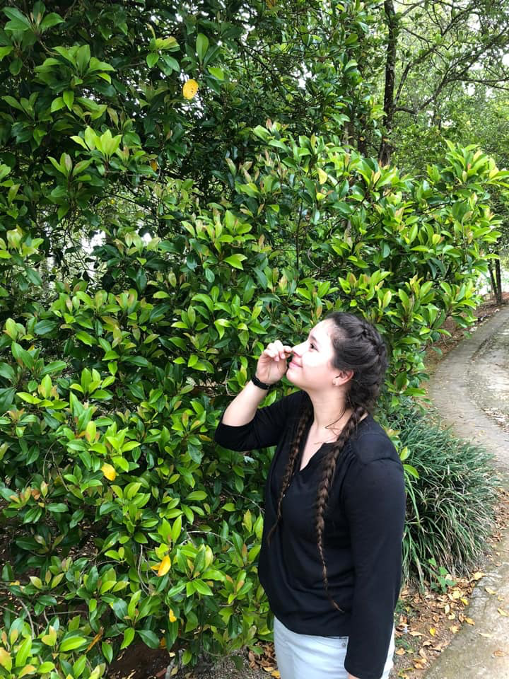Posted: June 9, 2021
Isabel Gutierrez traveled to Java, Indonesia in December 2019 to learn about cloves and clove farming practices.
Isabel Gutierrez is a master's student in Food Science and INTAD studying with Drs. Josh D Lambert and Helene Hopfer. Her research explores the effects of geographical location and harvest time on the chemical composition of clove oil and clove post-distillation byproducts (the "waste" material). She also studies the efficacy of anti-cancer properties of clove oil and byproducts on human cancer cell lines. Isabel participated in a scouting trip to Indonesia to meet with PT Indesso Aroma, one of Indonesia's key manufacturers of food, flavor, and fragrance ingredients, and to tour clove farms and processing facilities. This trip also allowed Isabel to gain a better understanding of the Indonesian clove supply chain and formulate research questions for her successfully granted INTAD competitive grant.
Indonesia is a country in Southeast Asia made up of over 17,000 islands. It is the largest producer of clove in the world with thousands of smallholder farmer households cultivating cloves around the country. However, the majority of clove production stays in Indonesia for the tobacco industry’s kretek (clove cigarettes) manufacturing.
During her time in Indonesia, Isabel visited clove farms that supply Indesso with clove oil. She learned how clove farmers intercrop their trees and about the different clove harvesting methods: by lopping or picking by hand with precarious looking ladders. Interestingly, none of the farmers depend exclusively on clove production as it is not a very lucrative occupation. Farmers sometimes distill oil on their own farm using a method called hydro-distillation which provides additional income from the crop.
Through her research, Isabel found that the location and time of harvest significantly affect the major volatile composition of clove oil. Differences in farming practices could also have accounted for some of the variation observed in the study. Isabel worked with both leaf and buds from clove trees. Farmers in Indonesia are more likely to distill clove leaves than buds as they are easier to harvest or are just picked up from the ground.
During her analysis of the clove post-distillation byproducts, Isabel found new compounds in cloves that have not yet been reported in literature including cinchonidine and luteolin. She also found that the byproduct had higher anti-cancer properties than clove oils meaning this waste material could be utilized as more than fuel for the next batch of oil or compost. She hopes that farmers can use the information she found to continue developing their farming and processing practices and to gain a better understanding of how these practices can influence quality.
Isabel successfully defended her thesis titled “Phytochemical Composition and Bioactivity of Clove (Syzygium aromaticum) Oil and Post-Distillation Biomass Extract” at the end of May 2021. For further questions about Isabel’s work or interest in reading her thesis, please reach out at img5144@psu.edu
Acknowledgements
Isabel Gutierrez’s thesis project received funding from:
Penn State Institute of Energy and the Environment (PSIEE)
PT Indesso Aroma
INTAD
Address
Melanie Miller Foster106 Agricultural Administration Building
University Park, PA 16802
- Email mjm727@psu.edu
- Office 814-863-0249
- Fax 814-865-3055
INTAD
Address
Melanie Miller Foster106 Agricultural Administration Building
University Park, PA 16802
- Email mjm727@psu.edu
- Office 814-863-0249
- Fax 814-865-3055


